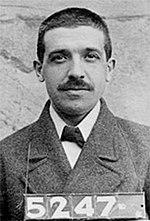
Meet Charles Ponzi, of the eponymous scheme. Cheery looking chap, isn’t he? The Times of July 28, 1920, reported thus:
An amazing “get-rich-quick” scheme, whereby Mr Charles Ponzi, a short time ago a relatively poor man, now estimates his wealth at upwards of £1,700,000, has attracted the attention of the public authorities of Boston.
The extraordinary feature of the case is that the authorities are not at all certain that Mr Ponzi’s operations are in any way illegal, and have only called a halt until his accounts, which run into millions of dollars, can be audited.
His arrest was quite a circus:
Mr Ponzi surrendered yesterday to the Federal authorities just in time to prevent his arrest by the State officials. It is said that the completed audit of Mr Ponzi’s affairs will show a deficit of at least £600,000. It is estimated that during the past six months he received from investors nearly £2,500,000, that in the fortnight since the run on his bank began he paid out about £1,500,000, and that his securities, realty, and other assets amount to perhaps £800,000.
The statement by the Federal auditor that Mr Ponzi’s accounts would show a deficit resulted in scenes almost approaching riot. The streets of South Boston were filled with hundreds of Poles, Italians, Greeks, and Lithuanians who had entrusted their savings to his charge.
This was before the foundation of the Palm Beach club, of course.
